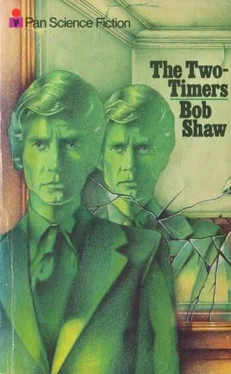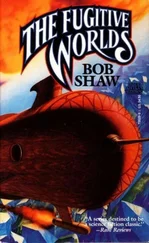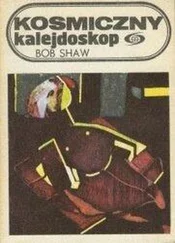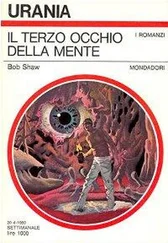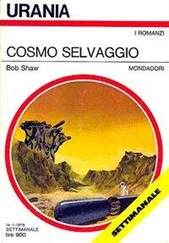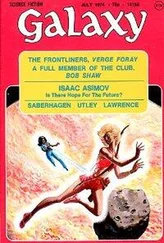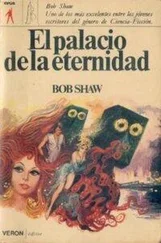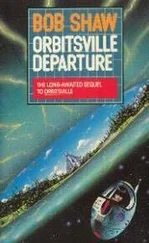Bob Shaw - The Two Timers
Здесь есть возможность читать онлайн «Bob Shaw - The Two Timers» весь текст электронной книги совершенно бесплатно (целиком полную версию без сокращений). В некоторых случаях можно слушать аудио, скачать через торрент в формате fb2 и присутствует краткое содержание. Год выпуска: 1971, Издательство: Pan SF, Жанр: Фантастика и фэнтези, на английском языке. Описание произведения, (предисловие) а так же отзывы посетителей доступны на портале библиотеки ЛибКат.
- Название:The Two Timers
- Автор:
- Издательство:Pan SF
- Жанр:
- Год:1971
- ISBN:нет данных
- Рейтинг книги:5 / 5. Голосов: 1
-
Избранное:Добавить в избранное
- Отзывы:
-
Ваша оценка:
- 100
- 1
- 2
- 3
- 4
- 5
The Two Timers: краткое содержание, описание и аннотация
Предлагаем к чтению аннотацию, описание, краткое содержание или предисловие (зависит от того, что написал сам автор книги «The Two Timers»). Если вы не нашли необходимую информацию о книге — напишите в комментариях, мы постараемся отыскать её.
THE TWO-TIMERS is his third novel, but the first to achieve maior publication.
The Two Timers — читать онлайн бесплатно полную книгу (весь текст) целиком
Ниже представлен текст книги, разбитый по страницам. Система сохранения места последней прочитанной страницы, позволяет с удобством читать онлайн бесплатно книгу «The Two Timers», без необходимости каждый раз заново искать на чём Вы остановились. Поставьте закладку, и сможете в любой момент перейти на страницу, на которой закончили чтение.
Интервал:
Закладка:
But Soderman had stopped listening — he was too busy with the pleasurable business of simply being alive.
Dr. Fergus B. Raphael sat quietly at the wheel of his car, staring across the oil-dappled concrete of the university parking lot.
He was seriously contemplating driving away towards the ocean and never being heard of in academic circles again. There had been a time when he had tackled his work with supreme enthusiasm, undeterred by the realization that — in the very nature of things — he would never achieve the rewards which were possible for workers in other fields. But the years had taken their toll, the years of living on the wrong side of the scientific tracks, and now he was tired.
He put aside the daily pretense that he was free to drive away from his obsession, and got out of the car. The sky was overcast and chestnut leaves were scuttling noisily before a cold, searching wind. Raphael turned up his coat collar and walked towards the unremarkable architecture of the university. It looked like being yet another very ordinary day.
Half an hour later he had set up the first experiment of the morning. The volunteer was Joe Washburn, a young Negro student who had shown flashes of promise in a previous series of tests.
Raphael raised a microphone to his lips. “All set, Joe?”
Washburn nodded and waved to Raphael through the window of his soundproof booth. Raphael moved a switch and checked with his assistant, Jean Ard, who was sitting in a similar booth at the opposite side of the laboratory. She gave him an exaggeratedly cheerful wave, which Raphael took as an indication that she too was feeling depressed. He started the recording machine, then leaned back in his chair, unwrapping a cigar, and watched the visual monitors with dutiful eyes.
Not for the first time, he thought: How long does this farce have to go on? How much proof do I need that mind-to-mind communication is impossible?
Jean Ard keyed in her first symbol and a triangle appeared on her monitor. Her face was impassive behind the thick glass of the booth and Raphael wondered if she always tried to concentrate and project, or if she ever just sat there, pushed buttons and thought about her evening date. A few minutes later Washburn’s monitor lit up — a triangle. Raphael ignited his cigar and waited, wondering how soon be could break off and go for coffee. A square appeared on Jean’s monitor, followed by a square on Washburn’s. She tried a triangle again, and Washburn matched ber. Then a circle and a star, and Washburn registered a circle and a star. In spite of himself, Raphael’s pulse began to quicken and he felt a recurrence of the old nervous fever which might have made him a chronic gambler had be not found a way to sublimate it in research. He watched closely as Jean continued keying in at random the five abstract symbols they used in the telepathy experiments. Eight minutes later she had gone through a complete test sample of fifty projections.
And Joe Washburn’s score was exactly fifty.
Raphael stubbed out his cigar with a shaking hand. He felt deathly cold as he raised the microphone, but he kept his voice as flat as possible to avoid injecting even the minutest disturbance into the experiment.
“That was all right for a warm-up, Jean and Joe. Let’s run through another set.” They both nodded. He moved a switch and spoke to Jean only. “I’d like you to use both the abstract and the related symbols this time.”
He hunched over the console and watched the monitors with the eyes of a man playing Russian roulette. The addition of the five meaningful symbols — tree, automobile, dog, chair, man — brought the range up to ten, and made a freak run of success that much more difficult.
Washburn made one mistake in the next series of fifty, and no errors at all in the following three sets. Raphael decided to introduce the demons of emotion and self-consciousness.
“Listen, you two,” he said thickly. “I don’t know how you’re doing it, but you’ve been scoring virtually one hundred percent since this experiment started, and I don’t have to tell you what that means. Now let’s keep blasting away at this thing till we see how far it’s going to go.”
Washburn made four mistakes in the next set, two in the following set, and none in the five further tests which Raphael put him through before switching off the recording equipment. Both Jean and Washburn had to examine the print-out for themselves before they accepted that the whole affair had not been a trick devised by Raphael to introduce a new experimental factor. When the truth had sunk in they stared at each other with cautious, wondering eyes.
“I think it’d be a good idea if we had some coffee now, Jean,” Raphael said. “This needs some thinking about.”
While Jean was fixing coffee, Joe Washburn wandered around the laboratory grinning, shaking his head and driving his fist into the palm of his left hand. Raphael lit another cigar and put it out almost immediately, realizing he would have to tell somebody about what had happened. He went to the phone and was on the point of lifting it when it rang.
“A long-distance call for you, Dr. Raphael,” the university operator said. “It’s Professor Morrison calling from Cleveland.”
“Thank you,” Raphael said dully, shocked at the coincidence. He had been going to call Morrison, who was his closest friend among the handful of men still working in the unfashionable field of extrasensory perception. Somehow, he had a prescient awareness of why Morrison was calling, and the feeling was confirmed when he heard the other man’s excited tones.
“Hello, Fergus? Thank God I got hold of you — I had to get this off my chest to somebody before I exploded. You’ll never guess what’s been happening here.”
“I will,” Raphael said.
“Try it then.”
“You’ve begun getting hundred percent successes in telepathy experiments.”
Morrison’s gasp of surprise was clearly audible. “That’s right. How did you know?”
“Perhaps,” Raphael said somberly, “I’m telepathic too.”
VIII
A full day had passed before Jack Breton’s consternation over the fragment of poetry began to abate.
He had questioned Kate about it as closely as he dared and, when he learned how it had been written, pretended a sympathetic interest in automatic writing. Kate had seemed pleased and flattered at his support, and had explained in detail everything she knew about Miriam Pa]frey’s powers.
Becoming more and more uneasy, Breton had examined hundreds of samples of the automatic writing and learned that the piece of verse was the only thing of its kind Miriam had ever produced. Furthermore, she had done it within hours of his arrival in the Time B world — which would hardly be a coincidence. The only answer his mind could produce, no matter how he juggled the facts, was telepathy — and the last thing he wanted was somebody reading his mind.
On the following morning his guess, wild as it had seemed, was confirmed in an unexpected manner. The apparent breakdown in John Breton’s relationship with Kate had accelerated visibly since Jack’s arrival. He had become more withdrawn, more caustic when he did speak of her, obviously in the throes of assessing his whole life. And, as if to assert his claim to an independent existence in his own universe, he constantly patrolled the house with a radio tucked in the crook of his arm, turning it to full volume at every news broadcast.
The newscasts he overheard told one part of Jack Breton’s mind that some very unusual events were taking place, but he was too deeply involved in working out his own personal destiny to pay much attention to stories of scientific curiosities. Had he not been weighing up his plans in the light of the fact that Miriam Palfrey appeared to have snatched something right out of his mind, he would not have absorbed the news that telepathy experiments in several universities had suddenly begun to yield dramatic results. The information served to demote Miriam from the status of an inexplicable menace to that of the other background phenomena.
Читать дальшеИнтервал:
Закладка:
Похожие книги на «The Two Timers»
Представляем Вашему вниманию похожие книги на «The Two Timers» списком для выбора. Мы отобрали схожую по названию и смыслу литературу в надежде предоставить читателям больше вариантов отыскать новые, интересные, ещё непрочитанные произведения.
Обсуждение, отзывы о книге «The Two Timers» и просто собственные мнения читателей. Оставьте ваши комментарии, напишите, что Вы думаете о произведении, его смысле или главных героях. Укажите что конкретно понравилось, а что нет, и почему Вы так считаете.
